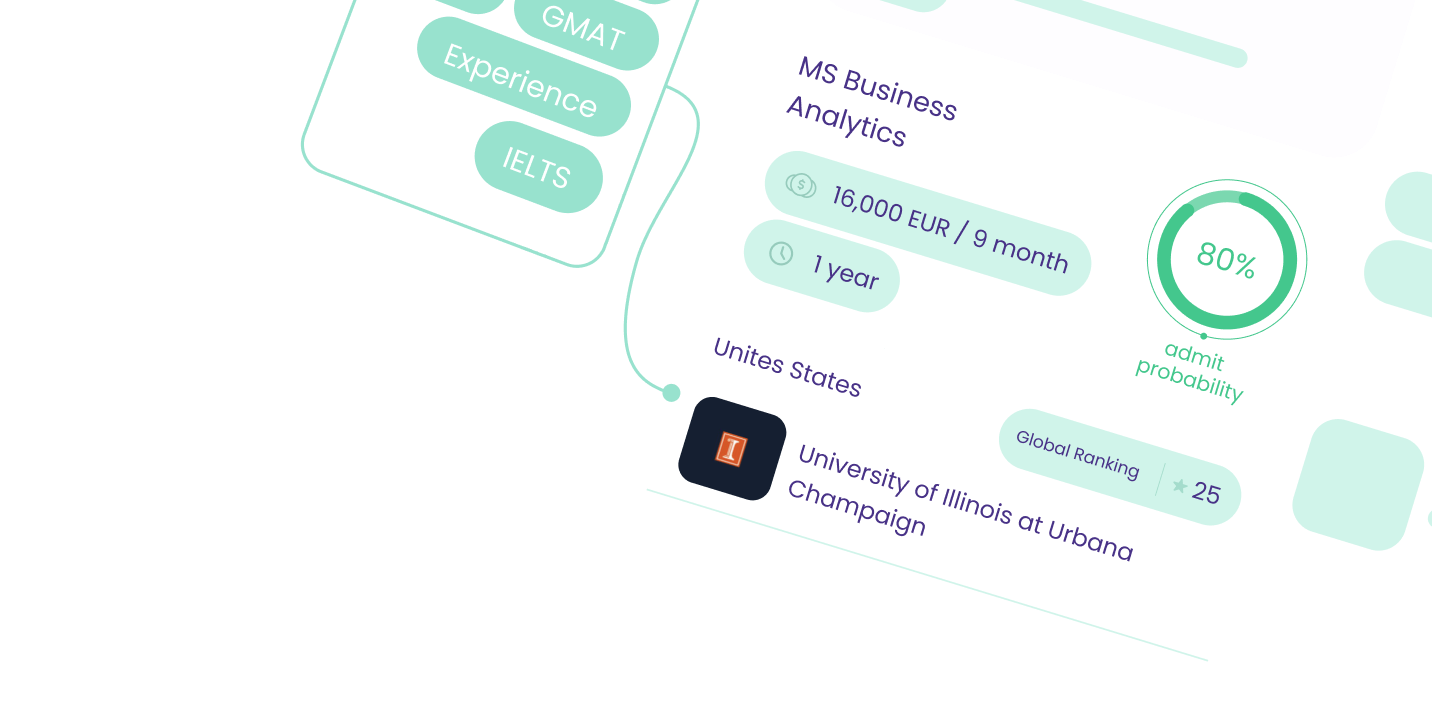GRE, or Graduate Record Examination, is the most difficult examination in the world, conducted by ETS (Educational Testing Service). GRE is a gateway exam that helps students to take admission to any prestigious college/university in any discipline and field across the globe.
GRE examination is conducted in both online and offline modes, and students can choose the mode of exam according to their convenience.
Online (computer-based) and offline (pen and paper-based) exam patterns slightly differ from one another in terms of the format. However, the complete GRE format, examination and the syllabus remains the same for both online and offline modes.
And if you are aspiring to take this examination, you must learn about the essential details to familiarise yourself with the exam before taking the test.
Knowing about the exam details can help you prepare well for the exam. And here we will share a GRE beginners guide that will include all essential details about the exam like format, structure, duration, syllabus, and more.
Table of Contents
The Complete Syllabus of GRE Examination

GRE examination is conducted in two parts- General and subject-based. Both the general and subject-based test syllabuses are different. And the Educational Testing Service decides the syllabus for both subject-based and general exams.
The general test is the standard GRE examination that tests students’ analytical writing skills, quantitative reasoning, and verbal reasoning. And the subject-based test is for students who want to take specialised courses. The subject-specific test primarily focuses on testing the technical skills of students in their chosen subjects or fields. And below are the details of GRE examination syllabus-
GRE examination syllabus for the general test
- Analytical writing skills – This section includes clear and effective articulation of complex ideas. Support ideas with proper reasoning and examples. Examination claims with supporting evidence and making a coherent decision, and controlling the elements of the standard English language.
- Verbal reasoning – Analysing and drawing the conclusion from discourse like incomplete data, author’s intent, multiple meanings, etc. Summarise text, understand its structure, and separate major points from irrelevant ones.
- Quantitative reasoning- Individual words and their meanings, meaning of word, sentence and complete text, the relationship between concept and words, etc.
Subject-based test syllabus
The subject-based test syllabus varies from one subject to another as they help to test your technical understanding about a specific subject. Some of the primary subjects included in GRE subject-based tests are- biology, chemistry, literature, mathematics, physics, and phycology. And each has its different syllabus–
- Biology – Organismal Biology, Cellular and Molecular Biology, Ecology, and Evolution.
- Chemistry – Analytical chemistry, organic chemistry, inorganic chemistry, and physical chemistry.
- Literature – Literary analysis, cultural and historical contexts, identification and history, and theory of literary criticism.
- Mathematics – Algebra, Calculus, and additional topics.
- Physics – Electromagnetism, Classical Mechanics, Optics and Wave Phenomena, Quantum Mechanics, Atomic Physics, Thermodynamics and Statistical Mechanics, Special Relativity, Specialized Topics, and Laboratory Methods.
- Psychology – Developmental, Social, Biological, Cognitive, Clinical, Methodology/Measurement/others.
Exam Format of GRE Examination

GRE examination format or pattern is equally important as the exam syllabus. Knowing the exam format helps you to familiarise yourself with the exam and its pattern, and you can prepare well for the exam.
GRE examination is conducted in two forms – computer-based and pen and paper tests and each type has its different format; below, we will discuss them in detail. However, in both exam formats, analytical writing comes first, followed by verbal reasoning, quantitative reasoning, unscored, and research.
GRE examination format
| GRE exam sections | Pen-paper based | Computer-based |
| Analytical writing | 2 section, two tasks in 60 minutes. | 1 section, 2 tasks in 60 minutes. |
| Verbal reasoning | 2 section, 50 questions in 70 minutes. | 2 section, 40 questions in 60 minutes. |
| Quantitative reasoning | 2 section, 50 questions in 80 minutes. | 2 sections, 40 questions in 70 minutes. |
| Unscored | N/A | N/A |
| Research | N/A | N/A |
Test Duration of GRE Examination
The GRE examination duration varies depending on the test mode and type (General and subject-based). And when you prepare for the GRE exam, you must know about the test duration to help you in time management so that you can finish your test on time. Here are the test duration details given below-
GRE General test duration:
| GRE sections | Duration |
| Analytical writing | 1 hr. (30 minutes for each section). |
| Verbal reasoning | 1 hr. (30 minutes for each section). |
| Quantitative reasoning | 1hr. 10 min. (35 minutes for each section). |
| Total | 3 hrs. 10 minutes. |
GRE subject-based test duration:
GRE subject-based test has no breaks like the general test. And the total GRE subject test duration is 2hrs. and 30 minutes for all subjects.
The Eligibility for the GRE Examination

The GRE examination has set eligibility criteria and only students who can fill all the eligibility criteria can appear in the GRE exam. The eligibility criteria are declared by ETS, and if you are preparing for the GRE, you must know the eligibility criteria to appear in the exam. However, you must remember that ETS has not declared any age limit or qualification for the test. Below is the list of eligibility requirements for GRE 2023-
- Age criteria – According to ETS there is no age restriction for GRE. However, candidates must be the age of 18 years minimum.
- Educational qualification – ETS has no set Educational qualification limit, but as the test is for undergraduate/postgraduate admissions thus, students must have passed the 12th class examination or equivalent examinations.
- ID proof– All candidates willing to apply for the GRE exam must have valid ID proof to register and attend the exam.
- Taking the test – All candidates can attempt the tests 5 times yearly. However, must be a 21 day gap between every test.
- Nationality – All nationalities are included for the GRE exam.
- At-home eligibility – Almost everyone has the option to choose at home test option except students from mainland China and Iran.
Skills and Concepts Required for the GRE Examination

GRE test is a getaway to take admission in prestigious schools/colleges/ universities in the world in any discipline. Therefore, a student who wants to take the test must have relevant skills and concept understanding. And below are the skills and concepts required for GRE examination-
- Verbal content– All candidates must have a good command over verbal content like reading comprehension, vocabulary.
- Quantitative reasoning – For this section, students must have a good understanding of general mathematics like algebra, arithmetic, geometry, ratio, percentage, exponents, numerals, and statistics.
- Analytical writing – Logical reasoning, grammar, and mechanics.
- Time management – Time management is essential to complete the test within the set time without any problem.
- Under pressure performance – GRE is a high-pressure exam that requires good performance under pressure.
- Being consistent on easy problems – Consistency on easy problems is a must to obtain a high score on GRE.
Question Types for GRE Examination

The Graduate Record Examination (GRE) is a standardised test that many universities worldwide use to admit students to their graduate programs. The test is divided into three primary sections: verbal reasoning, quantitative reasoning, and analytical writing. Several question formats are used in each segment to gauge various talents and aptitudes.
Analysing a subject and an argument are the two duties in the analytical writing portion. In the first assignment, test-takers must critically evaluate a specific issue, while in the second task, they must evaluate the logic behind a specific argument.
The ability to assess and interpret textual content is tested in the Verbal Reasoning portion. The many questions include reading comprehension, sentence equivalence, and text completion.
Although sentence equivalence tasks call for selecting two words that can complete a phrase with the same meaning, text completion tasks challenge you to fill in the blanks in a piece. The purpose of reading comprehension questions is to evaluate a test taker’s capacity and interpretation of written material.
Maths skills are evaluated in the Quantitative Reasoning component of the exam. Comparing numbers and solving problems are examples of question kinds.
In the former, test-takers must compare two values and establish their connection, whereas, in the latter, test-takers should answer mathematical problems in a variety of subjects, including algebra, geometry, and data analysis.
What to Do After Attempting the GRE Examination?

There are a few steps you should take after taking the GRE to increase your chances of being accepted into the graduate program of your choice. These are some actions to take:
Step 1
Once you have your GRE results, decide if you need to repeat the test or which score should be forwarded to the institutions for the admissions process.
Step 2
Start searching for graduate programs that you are interested in. Check into their entrance criteria, application deadlines, and any other pertinent information.
Step 3
Start preparing for the TOEFL and IELTS examinations, which serve as the English Language Proficiency Tests to evaluate your language proficiency. The results of these tests aid foreign students in gaining admission to prestigious colleges.
Step 4
Complete the university application forms and pay the application cost as specified by the university.
Step 5
Compile all the essential papers to get admitted to institutions after completing the application form. Do not hesitate to double-check anything on the universities’ official websites.
Step 6
After organising your application materials, confirm that a bank statement and affidavit must be attached to be eligible for a loan, as well as assistance with insurance and education.
Step 7
Apply for the MS or MBA program at your preferred university after finalising and receiving approval with the checklist.
After taking the GRE, being prepared, taking the time to evaluate your performance, and reacting where necessary to increase your chances of admission are the keys to success.
Preparation Tips for GRE Examination

Globally, graduate and business institutions utilise the Graduate Record Examination (GRE) as a standardised test for entrance. Even though GRE preparation might be intimidating, the appropriate strategy will help you get a high score. Here are some pointers to assist you in getting ready for the GRE test.
1. Read Several Analytical Non-Fiction
You should read multiple analytical non-fiction books as part of your GRE preparation since this is one of the most crucial things you can do. Your reading comprehension and critical thinking abilities will get better, which will help do well on the GRE. Try to read books on various subjects to become familiar with the various passage types you could face on the exam.
2. Consistent with Your Study Plan
It’s essential to stick to your study schedule while you get ready for the GRE. Please set up a study regimen that works with your lifestyle and follow it religiously. Give yourself ample time to properly cover all the content. You may increase both your endurance and confidence by practising frequently.
3. Take Multiple Online Mock Tests
You may find your skills and weaknesses by taking a number of online practice exams. Your knowledge as well as your test-taking abilities are tested on the GRE. You’ll gain confidence in taking the test by completing the practice tests, which will also help you comprehend the test’s structure and schedule.
4. Revision is Crucial
Success on any test, including the GRE, depends on preparation. Spend some time reviewing the material you have already learned and working to fully comprehend the ideas. To determine areas where you need to pay closer attention, make sure to evaluate your practice test scores as well as the notes you’ve taken.
5. Identify Your Weak Points
To perform better, you must first recognize your weaknesses. Make a note of the subjects or question types you have trouble with, and devote additional time to studying them. Get assistance from a friend or tutor who has expertise in the subjects you are considering difficult.
6. Keep Track of Your Progress
It is important to track your development while preparing for the GRE. Record the outcomes of your practice exams and track your progress over time. This will assist you in maintaining motivation and identifying areas that require greater attention.
7. Be Confident
Overall, have faith in your skills. You are capable of getting a high score since you studied hard for the test. The night before the test, make sure to obtain sufficient rest so that you can arrive at the test centre feeling confident and comfortable.
Several graduate programs and business schools evaluate applicants using the GRE, a standardised test. The GRE may first appear overwhelming if you have never taken it before. It’s critical to comprehend the GRE’s format, organisation, time limit, and curriculum if you’re a beginner preparing to take the exam.
Wrapping Up
So that’s it, folks! We’ve come to the end of our GRE guide for beginners. Hopefully, by now, you have a good grasp of the format, structure, duration, syllabus, and more of the GRE exam.
Remember, the GRE is a crucial test that can open doors to a range of opportunities, including admission to graduate and business schools. So, it’s essential to be well-prepared and familiar with the exam.
Make sure to give yourself enough time to study and practice regularly. Utilise all the resources available, including study materials, online courses, and practice tests.
Lastly, don’t let the exam intimidate you. Remember, it’s just a test, and with hard work and dedication, you can achieve your desired score. So, go ahead, give it your best shot, and good luck on your GRE journey!


Frequently Asked Questions
How many scores do you need to pass the GRE exam?
There are three components to the GRE exam. Your GRE verbal section minimum score is 130, your quantitative section minimum score is 130, and your analytical writing section minimum score is 0. So, disregarding the GRE Analytical part, the required GRE score is 260.
When should you start your preparation for the GRE exam?
For the majority of universities, the application process typically starts 10 to 12 months before the entrance and lasts until around 4 months before. As a result, it is advised that you write the examinations at least 14 months before the session you plan to enrol in.
How many times can you give GRE exam?
You can take the GRE more than once a year, depending on the availability of slots, as it is offered all year round. However, you may only repeat exams a maximum of five times each year. Moreover, a minimum of 21 days should exist between each consecutive retest.
Who can give GRE examination?
For the GRE Test, there are no precise requirements for eligibility. For the GRE 2023, there are no set age restrictions or prerequisites, and anybody can register. The GRE test must be taken by students who want to apply for admission to graduate schools overseas. Candidates are required to have successfully finished their undergraduate programs because the GRE is a test used to evaluate applicants for graduate entrance.
How to apply for the GRE exam?
Create an ETS account on the official GRE website to start the application process for the GRE. After that, pick a time and place for the exam that works for you, and pay the exam fee. Also, you may pay extra for supplementary services like score reporting. You will be informed of the date and place of your exam after submitting your application.






Comments (0)